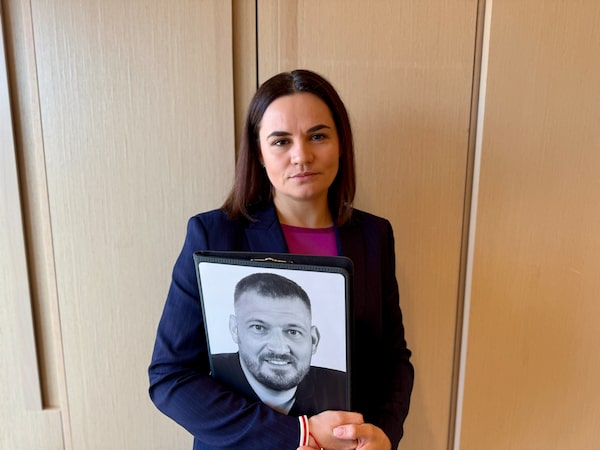
Sviatlana Tsikhanouskaya, exiled Belarusian opposition leader, holds a photo of her husband in Ottawa on April 15.Steven Chase/The Globe and Mail
Belarusian opposition leader Sviatlana Tsikhanouskaya, whose homeland is ruled by a strongman reliant on Russia to maintain power, visited Canada this week to ask for more help, including recognition of passports her organization is fashioning for compatriots like herself who live in exile.
Belarusian ruler Alexander Lukashenko, who held on to power in 2020 despite what Canada and many Western countries consider a fraudulent election, last September banned citizens from renewing their passports while staying abroad. This measure could force those who fled the country amid growing repression to return to maintain their travel documents.
An estimated 200,000 to 300,000 Belarusians have left the country in the more than 3½ years since massive protests against the election led to a harsh crackdown on the political opposition.
Mr. Lukashenko, who is dependent on Russia for economic and security aid, played a significant role in helping Moscow organize its 2022 military assault on neighbouring Ukraine.
Canada, which has been steadily ramping up sanctions on Belarus since the 2020 election, announced Monday it’s imposing sanctions on 21 Belarusians involved in the crackdown. Many in Belarus recognize Ms. Tsikhanouskaya, a candidate in the 2020 election, as their president in exile.
Monday’s sanctions target current and former senior government officials, including members of Belarusian security forces, public prosecutors, members of the judiciary system and administrators of penal and so-called education colonies “who have been involved in suppressing the right of Belarusians to protest peacefully,” a press release from the Department of Global Affairs said.
“They are imposed in response to systematic abuses committed by the Lukashenko regime and subsequent prosecutions of Belarusians protesting the results of Belarus’s 2020 presidential election,” which the Organization for Security and Co-operation in Europe described as “not transparent, free or fair,” it said.
Ms. Tsikhanouskaya, in an interview Monday, said Belarusian democratic forces are preparing a prototype of a passport that Belarusian citizens in exile can use. They are seeking acceptance of this document from foreign governments.
“We are going to issue our own passports and we will seek recognition,” she said. “It’s not just about Belarusian people; it will be a very decisive answer to dictators that they don’t own people. We are not their property.”
Global Affairs did not immediately respond to a question about her passport request.
She said Canada’s regular announcements of further sanctions on Belarus, often taken in concert with other allies, are a “constant reminder to the dictatorship that their crimes are not forgotten.”
Mr. Lukashenko recently announced he will seek re-election next year, despite Western condemnation of the 2020 ballot as a sham.
As Mr. Lukashenko’s reign drags on – he has been in power nearly three decades – Ms. Tsikhanouskaya said Belarusian democratic forces are seeking to formalize relationships with Western governments, either through special envoys or formal dialogues. She would like something similar with Ottawa, she said.
She compared her homeland now to the reign of terror under former Soviet boss Josef Stalin. More than 1,500 Belarusians are political prisoners for speaking out. “They search people’s apartments, they detain people: old people, minors, and there is constant fear among population,” the leader said. “Even in this situation, people try to resist: It’s an underground movement at the moment, with small acts of sabotage.”
Ms. Tsikhanouskaya warned Canadians that despite how far they live from Belarus, or Russia, that the threat to democracy in Central Europe will not be contained if Western countries do not resolve it. “Democracy itself is now in danger,” she said. “And don’t think that if [you] are somewhere far away that this, you know, this situation will not touch you. If we allow dictators to progress, you know, in their boldness, they might knock on your doors in the future.”
The Belarusian opposition leader, who together with her allies has been acting as government-in-exile, said she was grateful for Canada’s continued support. Canada also Monday announced $1-million for an organization in Canada that will support Belarusian journalists. She said it’s very expensive to maintain opposition to Mr. Lukashenko, from supporting political prisoners, non-governmental organizations and media operating outside Belarus, as well as Belarusians fighting for Ukraine in the war against Russia.
With a report from Associated Press
 Steven Chase
Steven Chase